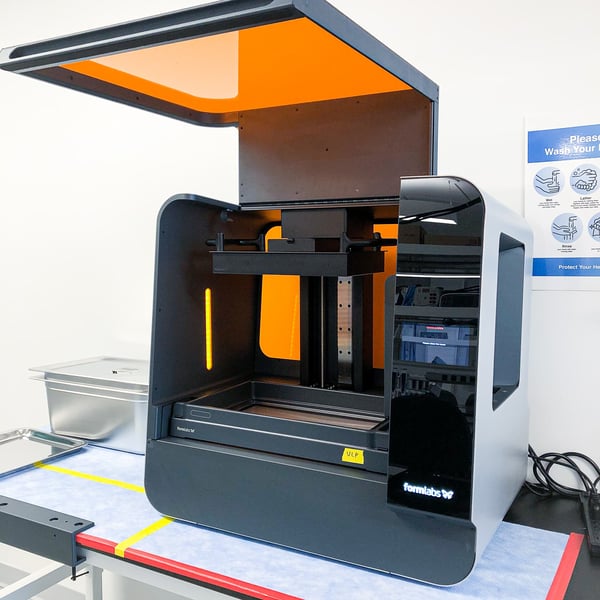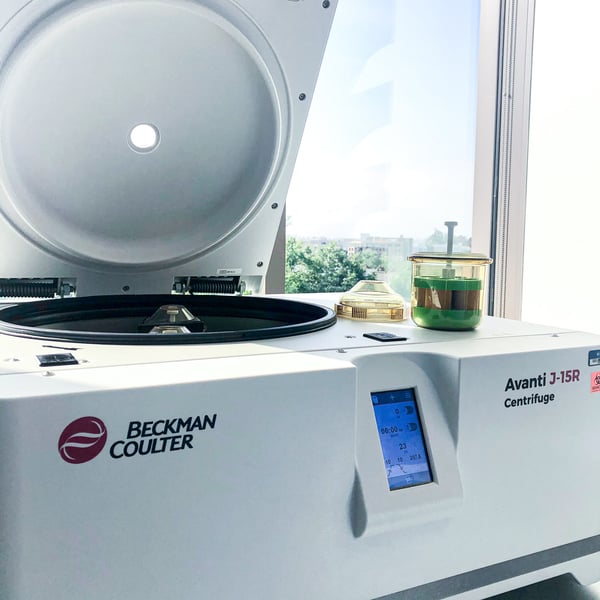This post will guide biotech startups through the process of purchasing new lab equipment.
The decision to buy a new piece of lab equipment is a big one for a biotech startup. Some types of equipment can easily cost more than multiple scientists’ salaries. Plus, equipment can require expensive maintenance and if something goes wrong, even pricier repairs. Therefore, making that initial choice to buy equipment and then deciding what model to get and from where, is not easy.
Keep in mind that the process of buying a new piece of equipment is lengthy. It can require many weeks of communication with sales representatives prior to making a choice. Some equipment is not kept in stock by manufacturers, but rather custom-built after the order is placed. Such pieces can take weeks or even months to arrive.
🔬 Read more about: Lab Space for Biotech Startups.
Many startups buy used equipment before they ever consider new items. Often they are cash-poor in their early days and have no other options, or they know they only need the equipment for a short time. However, there are good reasons to buy new equipment rather than used, even for a startup.
🔬 Read more about: Buying New Lab Equipment
CO2 incubators, for example, are "absolutely necessary to buy new - that's non-negotiable. You don't know how well a former owner took care of their incubator, whether they cleaned it, or whether they had fungal contaminations that may have left spores. A brand new CO2 incubator is the best way to ensure that you are starting with a clean environment for your cell culture work."
Nancy Withers, Sales Manager at Thermo Fisher Scientific
Used pieces of lab equipment, even refurbished, usually do not come with long warranties; the longest are perhaps 4 months. New equipment, on the other hand, often will have a 1 year warranty with an option to extend. Although new equipment may not seem as likely to break down, that isn’t always the case. Just like with cars, sometimes you get a “lemon” and end up having repeated issues with a piece of lab equipment. This is the kind of scenario that can make a warranty essential. With used equipment, you have to consider at what point the cost of potential repairs might actually add up to the price of a new unit, warranty and all.
To decide whether you want to buy your equipment new because of the warranty, consider how you will use it. If it will be utilized frequently or if it’s needed in time-dependent work, it’s especially important that if something goes wrong it gets fixed quickly. This might be a good reason to both buy the item new and to get the extended warranty.
"One of the items to always buy new is your ultralow freezer. Thermo’s freezers come with a 12-year warranty, but that warranty does not apply to used instruments. You want to know that your freezer will be capable of storing your most important samples and if it needs service, your warranty will cover it."
Nancy Withers, Sales Manager, Thermo Fisher Scientific
The question of whether to buy used or new equipment really only exists in early-stage, preclinical research and development labs. Once a company is operating in a regulated space, or even producing a product that will be part of a controlled animal trial, using new equipment becomes almost mandatory. When a piece of new equipment is delivered from a manufacturer, absent any damage from shipping, it should arrive in good working condition. The item will likely need to undergo installation qualification for quality assurance purposes. The unknown history of used equipment leaves too many possible variables to consider.
To learn more about regulatory requirements, see Quality Assurance and Quality Control for Biotech and Medtech Startups.

Once you’ve decided to buy a new piece of equipment, choosing the precise model and configuration is next. This can range from incredibly simple if there is only one option for the equipment, to incredibly complex if there are many options and many suppliers. Here we’ll look at relatively complex situation.
First, it is important to understand your lab’s needs. Do you need an instrument that has many options for accessories? Is the speed at which the instrument performs the most important consideration? Or do you need something that has been proven to have the highest precision in its class? Startups should also consider whether the equipment they are buying is compliant with 21 CFR Part 11 for FDA regulations. This section deals with the trustworthiness of electronic records and communications, including the digital records that are obtained directly from lab equipment. Make a prioritized list of what the most important considerations are for your new piece of equipment, including “must-haves” and “nice-to-haves.”
Next, shop around online and get a sense of how different models compare. If possible, find a few that at minimum fulfill all of your “must-haves.” Alternatively, contact the instrument manufacturers and talk to the field service agents. Their job is to understand everything about how the instrument can be used, so they can tell you which model is best for your application. Frequently they will help you identify questions that you didn’t even know to ask, such as whether you need certain accessories.
Another important factor to consider is the reputation of the company you are buying from. You want to buy equipment from a supplier that is known for good customer service and technical assistance. Also, look at the manufacturer’s reputation for the quality of their products. Some brands are known to need frequent repairs, so look for options that are reliable. Brand new startups will sometimes offer great deals for their instruments, but you have to balance that potential benefit with the risk that the company will not gain enough market traction to survive. An extended warranty doesn’t mean much if the seller has gone out of business.
Be aware that a common method of customer retention is to sell an instrument that requires brand-name consumables in order to use it. If you can only use one brand of consumables to run your instrument, then you can’t shop around when the price of those consumables inevitably goes up. However, it may be that the instrument is worth this cost due to its suitability for your use, overall quality, or the reliability of the brand.
Once you have narrowed your list down to two or three top options, the next step is to consider price.

The best thing you can do to get good pricing is to shop around. Comparing prices from multiple suppliers is incredibly helpful when trying to save money on equipment. Ask your sales representatives to give you a quote for the specific model you’re looking for. Especially for the most expensive equipment, this can take time. Make sure to notify your sales representative if you are part of an industry organization in case they give special pricing to members.
Many suppliers have lab start-up deals, which may provide the best discount--especially when buying multiple items at once. Withers adds, “Volume is always more likely to get you a better price when buying new equipment. But it doesn’t matter where that volume comes from, so if you can buy consumables, kits, or anything else along with the equipment you will get a better price on the bundle than you would have by buying each piece alone.”
Once you receive quotes, examine them carefully. Often the sales representative will include items that you did not specifically request, such as accessories that you may or may not actually need. Compare the quotes to see if the prices are similar, and if there is a big difference try to find out why. It may be that one is including an extended warranty or another is running a sale.
When comparing different offers for the same model, ask the sales representatives to beat each other’s prices. Be open about the fact that you are shopping around and looking for the most competitive prices. This incentivizes the sales representatives to provide the best price possible. However, the best deal may come in the form of other types of discounts. Depending on the type of equipment, it may require the use of specific consumables. Perhaps the sales representative can give you a set amount of free consumables, or provide a discount that your company can use for the life of the instrument.
You can also negotiate for a better warranty, preventive maintenance contracts, free installation and training, and free shipping (which can be expensive for large instruments). Sometimes the sales representatives will have more leeway on the whole package than on the instrument by itself.
A note about warranties and preventive maintenance contracts: If there is a good 1-2 year warranty on the instrument you’re buying that includes service, you don’t need to also buy a preventive maintenance contract. This is a good way to save money as a startup. Most likely by the time the warranty expires you will have raised your next round of investment or won another grant, so paying for preventive maintenance contract at that point won’t be difficult. Or, you may be buying another new instrument to handle your increased volume of operations.
🔬 Learn more: 11 Equipment & Amenities Every Wet Lab Incubator Needs
.jpg?width=600&name=2021-07-07%20Agilent%20%2311%20(1).jpg)
Most companies will bring a demo unit to you to try out before you make a purchase. Take advantage of this so you can see how everything works, determine whether your scientists are happy with the user interface, and ask as many questions as possible. The demo unit will be accompanied by a field service technician, which will give you the opportunity to discuss your needs fully. Even better, most demonstrations will include a chance to run your own sample through the instrument/try out the actual application you’d be using it for.
If you haven’t had a thorough conversation about the warranty yet, this is another good time to talk about it. Ask questions that are informed by the demo, as things like moving parts, light bulbs, and pieces that must be removed are more likely to require replacement. Find out exactly what is covered, what you should expect to need service, and what you can do to keep your instrument in top condition.
Notify the sales representative for the company that you have chosen to buy from. Additionally, tell the sales representatives that you are not purchasing from about your decision. They likely have quotas to meet, so the sooner they know that they have lost the sale with you, the better. And be nice to them--they have put time and effort into working with you, and you may find yourself asking for quotes from them in the future.
Once you have placed the order, confirm with your sales representative what the delivery timeline is, how the item will be delivered, when the installation will take place, and when you can schedule training. With new equipment it is especially important to request “white glove” delivery so you know the instrument will be moved into place by professionals. This prevents you from taking on liability if you try moving it yourself and damage something.
While you wait for your new equipment to show up, prepare the space where it will go. If the item requires a different electrical plug, have it installed ahead of time. Make sure you clearly understand what the installation technician will expect you to have done beforehand.
Buying new laboratory equipment is in some ways a right of passage for a young biotech company. It is an investment into your company’s success, so with forethought and strategic planning you can be sure the instrument you buy is the best one for your needs.
Download The Ultimate Guide to Wet Lab Incubators in Southern California, a handbook to assist life science start-ups through the entire decision-making process to find wet lab space.
Download Now